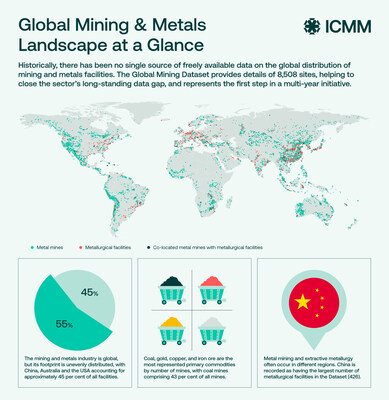- ICMM's new Dataset is the most comprehensive publicly available compilation of mining and metals facilities globally, including 15,188 mines and processing facilities covering 47 different primary commodities.
- Key insights from this first Dataset:
- The mining and metals industry is global, but its footprint is unevenly distributed, with China, Australia and the USA accounting for approximately 45 per cent of all facilities.
- Coal, gold, copper, and iron ore are the most represented primary commodities by number of mines, with coal mines comprising 43 per cent of all mines.
- Metal mining and extractive metallurgy (smelters, refineries and steel plants)) often occur in different regions. China is recorded as having the largest number of metallurgical facilities in the Dataset (426).
LONDON, Sept. 3, 2025 /PRNewswire/ -- Today, ICMM launches its Global Mining Dataset to address the lack of reliable, standardised data for the mining and metals sector. ICMM is embarking on a multi-year initiative that aims to significantly improve and transform the quality and accessibility of sector information by building robust, transparent data that can inform policy and advance wider discussions about mining and metals' evolving role in sustainable development.

As demand for minerals and metals grows to support the energy transition and sustainable development, there is an urgent need to overcome the longstanding lack of quality data that has hindered the ability of policymakers, investors, civil society, and the industry itself to draw fully informed opinions, craft effective regulations, and truly understand both the impact and contribution of the sector.
The first step in this initiative, has been the development of the 'Global Mining Dataset: Understanding the global distribution of mining and metals facilities' report which identifies how many mines, smelters, refineries and processing plants exist worldwide, where they are located, and what they produce. The Dataset was developed with support from Accenture, Global Energy Monitor, and Skarn Associates- with access to other public1 and proprietary sources2.
Rohitesh Dhawan, President and CEO, ICMM, said, "ICMM's foundational Dataset shows that over 75% of national economies have at least some connection to large-scale mining or mineral processing. Having a global view of the location, type, commodity and footprint of these facilities is essential to inform the right public and policy debates for this critical sector. With minerals and metals at the heart of the energy transition and geopolitical shifts, robust, global, industry-wide data has never been more critical.
"I'm proud to be able to say that ICMM's new Dataset is currently the most comprehensive publicly available compilation of mining and metals facilities globally. We hope this data will continue to expand and improve through partnerships, while we work on key sustainability indicators based on this for release in the coming months."
Janez Potocnik, Co-Chair of the International Resource Panel, commented: "Reliable, transparent, and consolidated data on the mining and metals industry is a foundational prerequisite for evidence-based policymaking, effective governance, and global progress towards sustainability targets. Only with robust data can we fully understand the sector's environmental, social, and economic impacts, monitor progress, and ensure accountability throughout global supply chains. The work of ICMM is an important contribution towards this vision."
Dr Emma Gagen, Director of Data and Research, ICMM, said: "Existing global data about the mining and metals sector is either incomplete, inconsistent, commodity- or region-specific, or locked behind paywalls, so transforming the information landscape that surrounds the sector is critical. Even such basic statistics as the number of mines, refineries and smelters globally have been difficult to determine in the past.
"Moving beyond fragmented reports to establish a credible source of information that captures mining and metals' multifaceted contributions and impacts is not a task we can-or want to-undertake alone. We invite regional and global partners from academia, consultancies, governments or commodity and national associations, to join us as we seek to close gaps in our current data to improve its accuracy, confidence and coverage, as well as build out future datasets."
The Dataset is likely an underestimate of the total number of large-scale mining and minerals processing facilities in the world based on its methodology.
Notes to editors
The Global Mining Dataset's first report, 'Understanding the global distribution of mining and metals facilities' is available at: https://www.icmm.com/en-gb/research/data/2025/global-mining-dataset. Including:
- More detail on the findings highlighted in this press release & the Dataset's methodology
- An external database for users of the Dataset (Excel) and a downloadable spatial file (Google Earth compatible)
- Media pack, including download links for a graphic image summarising high level findings and video content, is available here.
Footnotes:
- Public sources include: Jasansky, S., Lieber, M., Giljum, S. et al. An open database on global coal and metal mine production. Sci Data 10, 52 (2023). https://doi.org/10.1038/s41597-023-01965-y & Hudson-Edwards, Karen; Owen, John; Kemp, Deanna et al. (2023). Water and Planetary Health Analytics (WAPHA) global metal mines database [Dataset]. Dryad. https://doi.org/10.5061/dryad.j3tx95xmg
- Proprietary sources include: S&P Global, S&P Capital IQ Download.
About ICMM
ICMM stands for mining with principles. We bring together approximately a third of the world's mining industry, along with key partners to drive leadership, action, and innovation for sustainable development. Through collaboration, ICMM member companies set the standard for responsibly produced minerals and metals to help build a safe, just and sustainable world.
Infographic - https://mma.prnewswire.com/media/2762778/ICMM.jpg
![]() View original content:https://www.prnewswire.co.uk/news-releases/icmm-launches-a-global-mining-dataset-to-support-more-robust-data-on-mining-and-metals-302544414.html
View original content:https://www.prnewswire.co.uk/news-releases/icmm-launches-a-global-mining-dataset-to-support-more-robust-data-on-mining-and-metals-302544414.html

